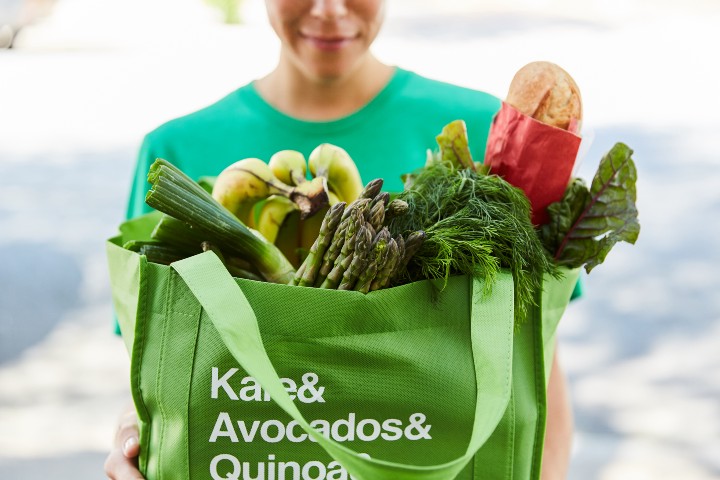You rely on consumer staples every day. They include daily essentials such as food and beverages, personal care products, and household and home care products.
People buy consumer staples regardless of the state of the economy, and the amount they buy is relatively fixed in good times and bad. In this way, the consumer staples sector behaves much differently than consumer discretionary businesses such as restaurants, hotels, and apparel, or consumer durables, which are long-lasting products such as furniture and electronics.

Consumer staples companies may not have the highest earnings growth or year-over-year revenue growth because these stocks tend to be large, mature companies, and the categories they compete in are typically developed. Historically, the sector has experienced relatively little disruption, and these stocks make up for modest growth with low price volatility, reliable profits, dividends, and defensive positioning.
What are consumer staples stocks?
Consumer staples stocks typically sell consumer goods that people use every day. These include everything from groceries, paper products, and cleaning products to over-the-counter health products, tobacco, and cosmetics. They are sometimes called fast-moving consumer goods, and the sector is also referred to as consumer defensive. These are products that are frequently consumed and turn over quickly in stores. They are also defensive because consumers buy them regardless of the state of the economy. Consumer staples are needs rather than wants.
Consumer staples stocks include both the companies that make these products and the retailers that primarily sell them, like supermarkets.
Advantages of consumer staples stocks
Consumer staple stocks have a number of advantages and benefits for investors. Those include:
- Consumer staples stocks are among the safest and most recession-proof stocks on the market. These companies sell products that consumers buy regardless of the economic environment, which makes them attractive, especially for risk-averse investors.
- These tend to be timeless companies. Businesses like Coca-Cola, PepsiCo, and Procter & Gamble have been around for more than 100 years, showing their ability to withstand a variety of challenges and remain at the top of their industries.
- Consumer staples stocks tend to be strong and reliable dividend payers. Many of them are Dividend Kings, or stocks that have raised their dividends every year for 50 years or more.
- Consumer staples companies can be resilient in inflationary environments because they often have pricing power and have the ability to pass along price increases and negotiate with suppliers.
- These companies have a long history of growing both organically through acquisitions, helping them maintain dominance over their industries.
Risks of consumer staples stocks
Just as there are advantages to owning consumer staples stocks, there are also risks. Let's take a look at a few:
- Consumer staples stocks tend to be expensive. Because they are considered safe, they tend to trade at higher price-to-earnings ratios than cyclical stocks, though this makes them more vulnerable to multiple compression, or a stock price falling because its valuation goes down.
- Consumer staples companies tend to be slow-growth businesses. Typically, these companies won't deliver the kind of eye-popping returns you might find from a tech stock. If they outperform, it's generally through a combination of dividends and a stronger performance during bear markets.
- Growth opportunities also tend to be limited because they generally compete in mature industries. The products that Procter & Gamble sells, like shampoo and razors, are well-established, and there is not much room for innovation.
- Consumer trends can affect performance. For example, pressure on soda and tobacco has led to some of those sector stocks underperforming in recent years.
- Returns can be lower, especially during bull markets. Investors tend to rotate into high-growth stocks during bull markets, meaning consumer staples stocks may underperform.
Consumer staples are noncyclical, meaning they offer investors safety during recessionary climates.
| Name and ticker | Market cap | Dividend yield | Industry |
|---|---|---|---|
| Procter & Gamble (NYSE:PG) | $339.7 billion | 2.87% | Household Products |
| PepsiCo (NASDAQ:PEP) | $200.9 billion | 3.78% | Beverages |
| Philip Morris International (NYSE:PM) | $231.3 billion | 3.72% | Tobacco |
| Costco Wholesale (NASDAQ:COST) | $397.0 billion | 0.56% | Food and Staples Retailing |
1. Procter & Gamble

NYSE: PG
Key Data Points
Procter & Gamble is best known for its marquee brands such as Tide, Gillette, and Crest. The household and personal care company is almost 200 years old. A large number of its brands hold the No. 1 or No. 2 market share position in their categories, including paper products, laundry detergent, diapers, and beauty products. P&G is also a Dividend King.
P&G has recently developed a number of innovative products, including the nontoxic insect repellent Zevo; a dye-free, silicone-free, and sulfate-free version of Head & Shoulders called Head & Shoulders BARE; and Spruce, a weed killer that cuts off the weed's water supply on contact. Spruce is P&G's first entry into the large lawn care category.
P&G has performed well during the recent inflationary era since it can pass along price increases to its customers, although its growth has slowed down recently. P&G finished its fiscal 2025 ending on June 30 with flat net sales and 2% organic sales growth. Core, or organic, earnings per share grew 4% to $6.83. Given the uncertainty around tariffs and weakening consumer sentiment, this shows the company's ability to deliver at least modest growth in challenging environments.
2. PepsiCo

NASDAQ: PEP
Key Data Points
PepsiCo is much more than its namesake beverage brand. The company also owns Frito-Lay and Quaker, as well as popular drink brands such as Mountain Dew and Gatorade. Its Frito-Lay snack business generates almost as much revenue in North America as its beverages, and that business has historically been a source of growth while soda sales have slowed in the U.S. and around the world. More recently, the snack business has declined due to general health trends and due to the adoption of weight-loss drugs like Ozempic. With its global brands and distribution, Pepsi enjoys many of the same advantages as industry giants P&G and beverage company competitor Coca-Cola (KO -0.51%).
Because of its exposure to the restaurant industry, Pepsi is subject to demand in the consumer discretionary channel, but with the help of the strength of its brands, it's been able to capitalize on inflation by raising prices, though headwinds from tariffs and consumption trends have affected profits. Through the first three quarters of 2025, organic revenue rose 1.5% though core earnings per share (EPS) fell 3.5%.
Pepsi has also grown through acquisitions. In 2018, it acquired SodaStream, which gave the company a leading position in countertop soda-making. It also bought energy drink maker Rockstar Energy in 2020. Earlier in 2025, it acquired Siete Foods, a maker of grain-free tortillas and Mexican-American foods, and Poppi, a prebiotic soda brand.
PepsiCo recently became a Dividend King, having raised its quarterly payout for 50 years in a row, which shows that it’s an attractive stock for income investors.
3. Philip Morris

NYSE: PM
Key Data Points
Philip Morris (PM -0.34%) is one of the three global tobacco giants, but the company has the strongest position of the three. Philip Morris was formed when Altria (MO -0.12%) and Philip Morris split in 2008, with Altria retaining the domestic business, while Philip Morris took the international markets.
That's proven to favor Philip Morris as international tobacco markets have been much more resilient than the U.S., where smoking has been steadily declining for decades.
In addition to its exposure to more smoking-friendly markets, Philip Morris has also outperformed peers like Altria and British American Tobacco (BTI +0.92%) in next-gen, smoke-free products, which now make up more than 40% of Philip Morris' revenue and a higher percentage of its gross profit.
The company has found success in IQOS, its heat-not-burn tobacco sticks, which use tobacco rather than the e-liquid vapes use, and heat to a temperature where it turns into vapor rather than smoke. As of the end of 2024, there were more than 32 million IQOS users worldwide, and the number was growing. The company launched IQOS in the U.S. in March 2025.
Additionally, the company's acquisition of Swedish Match in 2023 has paid off, giving it ownership of the popular Zyn oral nicotine pouches, whose shipments jumped 43% to 214.7 million cans in the second quarter of 2025. Philip Morris is also expanding production at its Kentucky Zyn facility and adding a new one in Colorado.
Finally, Philip Morris offers a reliable dividend yield of 3.7%.
4. Costco Wholesale

NASDAQ: COST
Key Data Points
Costco Wholesale has been one of the best-performing consumer staples stocks on the market in recent history.
Unlike the other stocks on the list, Costco doesn't make products for other retailers to sell. Instead, as a retailer of primarily consumer staples, more than half of its sales come from groceries.
Costco also has many of the components of a consumer staples stock that its customers look for, including a stable business model built around its reputation for bargain prices on bulk goods. Its membership model adds another layer of resilience since most of its profits come from membership fees. Customers typically renew memberships at a rate of around 90%.
The retailer continues to open new stores and has been delivering solid comparable sales growth and e-commerce growth.
Costco also has a track record of rewarding investors with special dividends every three to five years, which makes up for its paltry dividend yield of 0.5%.
Best consumer staples ETFs
For investors who prefer exposure to the entire consumer staples sector rather than picking individual stocks, buying shares in an exchange-traded fund (ETF) is the most sensible option. The chart below shows three consumer staples ETFs:
Fund Name | Expense Ratio |
|---|---|
Consumer Staples Select SPDR Fund (NYSEMKT:XLP) | 0.08% |
Vanguard Consumer Staples ETF (NYSEMKT:VDC) | 0.09% |
iShares U.S. Consumer Staples ETF (NYSEMKT:IYK) | 0.38% |
How to invest in consumer staples stocks
If you're looking to invest in consumer staples stocks, you can follow the steps below.
- Open your brokerage app: Log in to your brokerage account where you handle your investments.
- Search for the stock: Enter the ticker or company name into the search bar to bring up the stock's trading page.
- Decide how many shares to buy: Consider your investment goals and how much of your portfolio you want to allocate to this stock.
- Select order type: Choose between a market order to buy at the current price or a limit order to specify the maximum price you're willing to pay.
- Submit your order: Confirm the details and submit your buy order.
- Review your purchase: Check your portfolio to ensure your order was filled as expected and adjust your investment strategy accordingly.
Related investing topics
Are consumer staples stocks right for you?
The best consumer staples companies tend to have consistently strong organic sales, leading market shares, and attractive dividend yields. Although the industry sees relatively little innovation and growth, consumer staples products tend to be timeless, and these companies are likely to continue to endure.
Consumer staples companies have an excellent ability to withstand recessions, increase their dividends, and post consistent, incremental growth. All of those characteristics make them good choices for investors looking for reliable, income-producing stocks.







